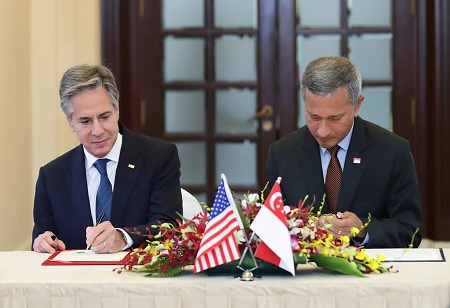
Singapore-US Nuclear Deal Marks region's Drive towards Alternative Energy

 Singapore’s recent nuclear energy agreement with the US is focused on exploring how this technology might address the city-state's energy needs. This development occurs as there is a renewed interest in using nuclear power in a region that remains dependent on natural gas and coal. “Nuclear energy is a solution for deep decarbonization of [Singapore’s] economy, as well as a viable solution for energy security given that more than 95 percent of its current resources to generate electricity are imported”, said Alvin Chew, a senior fellow at the S. Rajaratnam School of International Studies.
Singapore’s recent nuclear energy agreement with the US is focused on exploring how this technology might address the city-state's energy needs. This development occurs as there is a renewed interest in using nuclear power in a region that remains dependent on natural gas and coal. “Nuclear energy is a solution for deep decarbonization of [Singapore’s] economy, as well as a viable solution for energy security given that more than 95 percent of its current resources to generate electricity are imported”, said Alvin Chew, a senior fellow at the S. Rajaratnam School of International Studies.
Singapore and the US have signed a 123 Agreement to enhance collaboration on the peaceful use of nuclear energy. This agreement supports Singapore's exploration of clean energy options as part of its strategy to achieve net-zero carbon emissions by 2050.
The pact was signed by US Secretary of State Antony Blinken, who was visiting the island nation as part of an 11-day tour of Asia, and Singapore Minister for Foreign Affairs Dr Vivian Balakrishnan.
“This agreement builds on the long-standing civil nuclear collaboration between the United States and Singapore and outlines a comprehensive framework to deepen peaceful nuclear cooperation based on a mutual commitment to nuclear non-proliferation”, the two countries said in a joint statement on Wednesday.
The agreement is anticipated to be fully effective by the end of the year, pending review by the US Congress. Lasting for 30 years, the pact will provide Singapore with access to detailed information on American nuclear energy technologies and expertise that are currently subject to export controls. As a major player in the global semiconductor industry, Singapore heavily depends on petroleum and natural gas, which account for approximately 85 percent and 13 percent of its primary energy consumption, respectively.
The US-Singapore agreement arrives as several Asian countries consider nuclear power as an alternative energy source. Sharon Seah, a senior fellow at the ISEAS – Yusof Ishak Institute’s Climate Change in Southeast Asia Programme, noted that Singapore could play a crucial role in advancing regional nuclear safety knowledge as neighboring countries contemplate its use. Although Singapore has not yet decided on deploying nuclear energy, it is actively exploring the technology and its potential implications.
Singapore joins a list of 24 other countries, including China, India, Indonesia, Japan, and the Philippines, that have signed 123 agreements with the US. In signing this pact and taking part in other capacity-building initiatives, the two countries plan to “further strengthen civil nuclear cooperation to better understand how advanced nuclear energy technologies, including small modular reactors, can potentially support climate goals, while balancing critical energy needs”, said the statement. The statement added that through one such initiative, the US Foundation Infrastructure for the Responsible Use of Small Modular Reactor Technology or FIRST programme, Singapore could also better understand small modular reactors or more advanced nuclear energy technologies.

